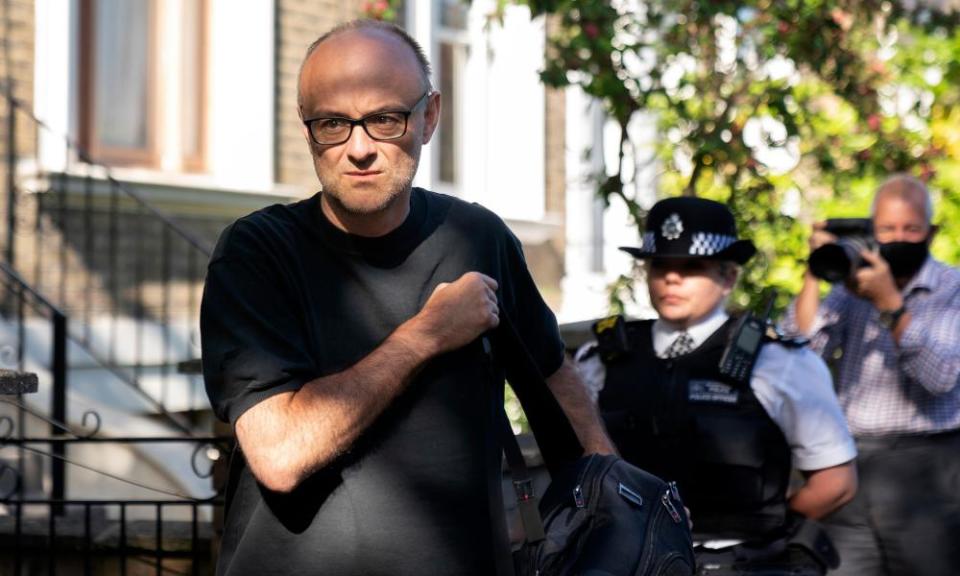Government fails to distance Dominic Cummings from sex discrimination case

Government lawyers have tried and failed to remove the name of Dominic Cummings from a sex discrimination claim being pursued by Sajid Javid’s former special adviser, the Guardian can disclose.
The demand was rejected after barristers for Sonia Khan, the former chancellor’s media adviser who was marched by armed police from Downing Street, successfully argued that the behaviour of Boris Johnson’s chief aide was pivotal to the case.
The disclosure will be seen as an attempt by the government to protect Cummings from further controversy. He is facing demands for his resignation after the Guardian revealed that he had driven hundreds of miles across the UK during the coronavirus outbreak.
It also means that Cummings could be made personally liable for part of any damages award.
Khan was Javid’s media adviser at the time she was escorted from No 10 after Cummings accused her of misleading him over her contact with individuals close to the former chancellor Philip Hammond. She denied any inappropriate contact. Javid was furious to learn about her dismissal after the event.

At an employment tribunal hearing in central London, a judge set the case for a five-day hearing in December at which the relationship between Cummings and Johnson will be scrutinised.
Barristers for Khan named Cummings as a respondent in the case, which also includes an unfair dismissal claim. It is understood that the government’s solicitors attempted to argue that his name should be removed and replaced as a respondent with that of the Cabinet Office.
Whitehall sources said Cummings planned to fight the claim.
Counsel for Khan, who is being backed by the FDA union, argued that Cummings was pivotal to the case and that what he had done personally, rather than just as an agent of the employer, was actionable. He is expected to be summoned as a witness.
The hearing ruled that the Cabinet Office could be added as a respondent but Cummings would also remain.
Khan, 28, was accused by Cummings of lying about her conversations with Hammond’s former staff member Poppy Trowbridge.
It is understood Khan was asked to hand over her work phone, and also presented her personal phone to Cummings.
There were no other firsthand witnesses to Khan’s sacking by Cummings, who spoke to her in an office in Downing Street close to the prime minister’s.
In a meeting days after Khan’s departure with Boris Johnson’s team of special advisers – known as spads – Cummings is said to have remarked: “If you don’t like how I run things, there’s the door.”
Bruce Carr QC, a former government adviser on employment law, said the naming of an individual as a respondent could mean he could be personally liable for damages.
“There are plenty of cases where it is appropriate and legitimate to include an individual as a respondent where that individual is central to the allegations of discrimination,” he said.
“Where that is or might be the case, it is actually very difficult for the principal respondent such as a government department to persuade a tribunal to strike out a claim against the individual named respondents.
“What you are effectively asking them to do is rule that the claim against the individual is frivolous or hopeless or is being brought for illegitimate reasons.”
Cummings has previously faced criticism over what some describe as his high-handed behaviour. In 2012, a senior civil servant received a payout of £25,000 from the Department for Education in a bullying case she took against Cummings and a senior member of Michael Gove’s team when Cummings was a special adviser at the department. An internal investigation found no grounds for disciplinary action.
Cummings also drew criticism for hiring Andrew Sabisky, a temporary contractor who resigned over comments about eugenics and race.
Johnson could also be asked to give evidence to the tribunal. At the time of Khan’s dismissal last September, the terms of employment for special advisers made it clear that it was only the prime minister who had the power to sack them. This was then changed after Khan left, giving Cummings ultimate “responsibility for disciplinary matters”.
Dave Penman, the head of the FDA, declined to comment on the specifics of the case. “The FDA continues to support Sonia Khan through her legal claims at tribunal,” he said.
A government spokesperson said: “We don’t comment on ongoing legal matters.”
A source added that it is standard government practice to ask for the employing department to be named as the respondent rather than individual employees.

